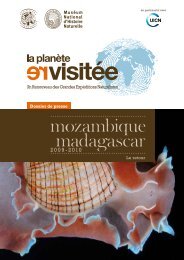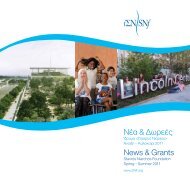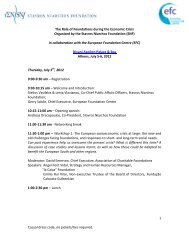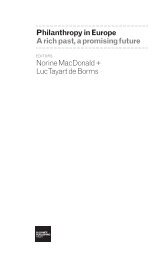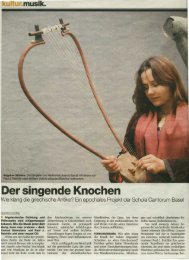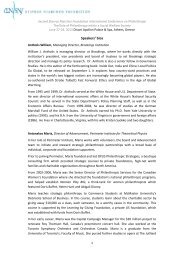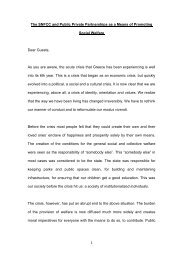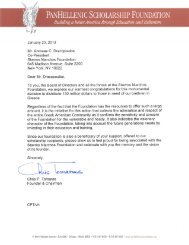Agora Publication - Stavros Niarchos Foundation
Agora Publication - Stavros Niarchos Foundation
Agora Publication - Stavros Niarchos Foundation
Create successful ePaper yourself
Turn your PDF publications into a flip-book with our unique Google optimized e-Paper software.
AGORA PUBLICATION<br />
VOL. 1 ISSUE 1, SEPTEMBER 16th 2011<br />
<strong>Stavros</strong> S. <strong>Niarchos</strong><br />
July 3, 1909 - April 15, 1996<br />
Welcome to our first bi-annual newsletter<br />
which we have named “<strong>Agora</strong>”. “<strong>Agora</strong>” is a public<br />
space. It is the place where citizens come together, where<br />
ideas and goods are exchanged and where politics are<br />
created. This newsletter informs students, faculty and the<br />
community at large who share our interest in Hellenism.<br />
We highlight those individuals and groups that have<br />
joined us on our journey and have impacted our<br />
program. Their contribution and enthusiasm have made<br />
the journey worthwhile.<br />
This first edition of “<strong>Agora</strong>” covers the period of January - July 2011<br />
and is dedicated to the memory of Emily McWhinney (page 11)<br />
$7,000,000 Dollar Donation<br />
Establishes The <strong>Stavros</strong><br />
<strong>Niarchos</strong> <strong>Foundation</strong> Centre<br />
for Hellenic Studies at<br />
Simon Fraser University<br />
Simon Fraser University announces the establishment<br />
of The <strong>Stavros</strong> <strong>Niarchos</strong> <strong>Foundation</strong> Centre for<br />
Hellenic Studies, created through a significant multimillion<br />
dollar grant by the <strong>Stavros</strong> <strong>Niarchos</strong> <strong>Foundation</strong>.<br />
The new Centre will establish Simon Fraser University as<br />
one of the premier locations for the study of Greek history,<br />
culture, and language outside of Greece.<br />
(continued on page 2)
Volume 1, Issue 1<br />
September 16th 2011<br />
Public Lectures &<br />
Events<br />
Community<br />
Outreach<br />
Student News:<br />
Scholarships &<br />
Awards<br />
Student News:<br />
Stories from<br />
Sarah Inglis<br />
Student News:<br />
Hellenic Studies’<br />
Perspectives<br />
Meet the Team<br />
3<br />
4<br />
7<br />
8<br />
10<br />
12<br />
(continued from page 1) The Centre will also expand significantly SFU’s<br />
current Greek language instruction programs for Chinese-speaking<br />
students which were established through another significant gift from<br />
the <strong>Stavros</strong> <strong>Niarchos</strong> <strong>Foundation</strong>. The heart of these programs currently<br />
is the highly successful Odysseas Online Language Tutor program,<br />
which is already used at 15 Chinese universities. The program<br />
has been recognized as a pioneer of online Greek language instruction.<br />
The <strong>Stavros</strong> <strong>Niarchos</strong> <strong>Foundation</strong> Media Lab will build on this platform<br />
by developing advanced technology for e-learning and online language<br />
tutoring.<br />
The new Centre will also focus on expanding links with Chinese academic<br />
institutions and encourage the development of Greek Studies<br />
in China. The Centre’s graduate program will train Chinese scholars<br />
in Greek history as well as, teachers to teach Greek language and<br />
other Greek-related courses in Chinese universities. Other activities<br />
planned, include the establishment of a Chinese Hellenic Studies Association<br />
and the creation of an online academic journal to publish the<br />
research work of Chinese scholars in Hellenic Studies as well as, to introduce<br />
the research work of Greek scholars in China.<br />
“At SFU, we are committed to community engagement, and this generous<br />
contribution from the <strong>Stavros</strong> <strong>Niarchos</strong> <strong>Foundation</strong> will help<br />
us engage with a whole new global community,” says SFU President<br />
Andrew Petter. “The <strong>Stavros</strong> <strong>Niarchos</strong> Centre for Hellenic Studies at<br />
SFU will build on our successful programs and truly connect education<br />
across continents.”<br />
Dr. Andre Gerolymatos, Chair of Hellenic Studies at SFU, says,<br />
“This gift is the result of a long-term relationship with the <strong>Stavros</strong><br />
<strong>Niarchos</strong> <strong>Foundation</strong>. The <strong>Foundation</strong> initially funded the development<br />
of our unique online language tutor program, and now<br />
we are excited that we will be able to expand our activities in China<br />
as well as in North America and Europe. (continued on page 3)<br />
Representatives from the <strong>Stavros</strong> <strong>Niarchos</strong> <strong>Foundation</strong> and SFU meet with students and faculty from Beijing Foreign Lanugauges University who<br />
are currently using the Odysseas Language Tutor.<br />
2
(continued from page 2) China, effectively, is the new<br />
frontier for Hellenic Studies and can dramatically<br />
extend the reach of Hellenism in Asia and the world.”<br />
Background<br />
Since its inception in 1996, Hellenic Studies at SFU<br />
has grown into a successful interdisciplinary program<br />
with a focus on history and language. Students<br />
have the opportunity to explore, research, and learn<br />
about archaeology, art and culture, politics, and<br />
history of both ancient and modern Greece. The<br />
program has consistently maintained high graduate<br />
and undergraduate enrolment levels.<br />
SFU’s relationship with the <strong>Stavros</strong> <strong>Niarchos</strong> <strong>Foundation</strong><br />
began in 2003, when the university received<br />
a series of generous grants that enabled SFU to create<br />
the Odysseas Online Language Tutor. The e-<br />
learning platform has since provided accessibility to<br />
Hellenic Studies for thousands of students worldwide,<br />
most notably in China.<br />
The <strong>Stavros</strong> <strong>Niarchos</strong> <strong>Foundation</strong> is one of the<br />
world’s leading international philanthropic organizations,<br />
making grants in the areas of arts and<br />
culture, education, health and medicine, and social<br />
welfare. While prominent in its support of Greek-<br />
“At SFU, we are committed to community<br />
engagement, and this generous contribution<br />
from the <strong>Stavros</strong> <strong>Niarchos</strong> <strong>Foundation</strong><br />
will help us engage with a whole new global<br />
community.” - President Andrew Petter<br />
related initiatives, the <strong>Foundation</strong>’s activities are worldwide in<br />
scope. To date, the <strong>Foundation</strong> has provided total grant commitments<br />
of €915 million/US $1.3 billion through more than<br />
2,000 grants to nonprofit organizations in 95 nations around the<br />
world. Having started its grant-making activities following <strong>Stavros</strong><br />
<strong>Niarchos</strong>’ death in 1996, the <strong>Foundation</strong> adheres in its mission<br />
to his global legacy, Greek heritage, and interest in providing<br />
underserved populations with access to opportunity. With offices<br />
in New York City, Athens, and Monte Carlo, the <strong>Foundation</strong><br />
funds institutions and projects that exhibit strong leadership and<br />
sound management and that have the potential to achieve a broad<br />
and lasting impact.<br />
Among other projects, the <strong>Foundation</strong> has committed to building<br />
The <strong>Stavros</strong> <strong>Niarchos</strong> <strong>Foundation</strong> Cultural Center in Athens,<br />
which will include new buildings for the National Library<br />
of Greece and the Greek National Opera, as well as the <strong>Stavros</strong><br />
<strong>Niarchos</strong> Park—all designed by internationally renowned architect<br />
Renzo Piano.<br />
Public Lectures & Events<br />
The panel of speakers at “The New Face of the Middle East” roundtable discussion, presented in collaboration with Global BC.<br />
From left to right: Kam Razavi (producer at Global National), Thomas Kuehn, Andre Gerolymatos, Sophie Lui (moderator,<br />
anchor at Global BC), John Harriss, Sadia Abbas, Graham Fuller and Tamir Moustafa.<br />
• January 10: “A Heretical History of the Parthenon”<br />
Lecture Series. Examined the fusion of pagan and christian<br />
culture that took place in Byzantine Athens. With<br />
special guest Professor Anthony Kaldellis, organized in<br />
collaboration with the Onassis <strong>Foundation</strong>.<br />
• February 10: “The Pronnoi Project”. Professor<br />
Geoffrey Schmalz shared his findings from SFU’s archaeological<br />
dig in Kefalonia, Greece (2008 - Present).<br />
THE STAVROS NIARCHOS FOUNDATION CENTRE FOR HELLENIC STUDIES<br />
www.sfu.ca/snfchs 3
Professor Anthony Kaldellis speaking at<br />
“A Heretical History of Parthenon”.<br />
Members of the community attending the “A World Without Islam” roundtable<br />
discussion with author Graham Fuller.<br />
• February 22: “A World Without Islam” roundtable<br />
discussion and release of Graham Fuller’s novel.<br />
In collaboration with SFU’s Centre for the Comparative<br />
Study of Muslim Societies and Cultures.<br />
• March 4: “Ships, Sailors, and the Surprising Story<br />
of Byzantium’s Dark-Age Urbanism”. Presented<br />
by Professor Dimitrios Krallis at “The Unexpected<br />
Mediterranean: An Interdisciplinary Workshop”.<br />
• March 17: “Antique and Medieval Perspectives<br />
on the Debate on the Place of Islam in Greece and<br />
Europe”. Presented by Professor Dimitri Krallis at<br />
“Greece, the Balkans and the Eastern Mediterranean:<br />
An International Symposium”.<br />
• March 17: “The New Face of the Middle East”<br />
roundtable discussion. Presented in collaboration<br />
with Global BC and moderated by Sophie Lui.<br />
Poster for “The New Face of the<br />
Middle East” roundtable discussion.<br />
Designed by Costa Dedegikas.<br />
4
Community Outreach<br />
• February 6: Film screening of “Charlie Wilson’s War”. Introduction<br />
by Professor Andre Gerolymatos, in collaboration with<br />
Vancity Theatre.<br />
• March 29: Film screening of “Act of Dishonour”. Introduction<br />
by Director Nelofer Pazira, in collaboration with Vancity Theatre.<br />
• March 30: “Female Voices of Afghanistan”: A discussion with<br />
Nelofer Pazira. Followed the screening of “Act of Dishonour”.<br />
• May 15: “The Battle of Crete” lecture by Professor Andre<br />
Gerolymatos. Introduction by Mayor Gregor Robertson, celebrating<br />
Vancouver’s 125th anniversary and the kickoff of Greek<br />
Heritage Month. In collaboration with the Creatan Association of<br />
BC and the Hellenic Canadian Congress.<br />
• June 14: Film screening and routable discussion of “Cyprus<br />
Still Divided”. Part of Greek Heritage Month, funded by the Hellenic<br />
Canadian Congress of BC.<br />
Poster for the “Cyprus Still Divided: A U.S. Foreign<br />
Policy Failure” film screening. Designed by Costa<br />
Dedegikas.<br />
Director Nelofer Pazira introducing her film “Act of<br />
Dishonour” at Vancity Theatre.<br />
From left to right: Community leader Nick Panos, Vancouver Mayor Gregor<br />
Robertson and President of the Cretan Association Nick Pappoutsakis attending<br />
“The Battle of Crete” lecture.<br />
THE STAVROS NIARCHOS FOUNDATION CENTRE FOR HELLENIC STUDIES<br />
www.sfu.ca/snfchs<br />
5
Professor Andre Gerolymatos Participates in Stephen Harper’s Canadian<br />
Delegation to Greece<br />
By Desiree Mamisao, Communications<br />
On May 28th and 29th, SFU Professor and<br />
Chair of Hellenic Studies Andre Gerolymatos<br />
participated in Prime Minister Stephen<br />
Harper’s official Canadian delegation to Athens,<br />
Greece. The purpose of the trip was to<br />
discuss bilateral relations between Canada and<br />
Greece, as well determine possible solutions<br />
to Greece’s current economic difficulties.<br />
“I am honoured to have been a part of these<br />
promising developments between Canada<br />
and Greece,” says Professor Gerolymatos. “It<br />
is good to witness our two countries establishing<br />
closer relations, as well as the promotion<br />
of mobility for our young people, as it<br />
offers young Canadians the opportunity to<br />
truly immerse themselves within Greek heritage<br />
and culture.”<br />
Professor Gerolymatos and Prime Minister Stephen Harper in Athens, Greece.<br />
20 Students Selected to Participate in the ‘Dig Greece’ Semester Abroad<br />
Program This Fall<br />
By Professor Geoffrey Schmalz, Program Director<br />
Due to the increasing popularity of the<br />
‘Dig Greece’ program, which is limited<br />
to twenty students each year, this year’s<br />
selection process was the most rigorous and<br />
challenging to date, and a significant number<br />
of very good applications had therefore to be<br />
turned down.<br />
The selected group of twenty students represents<br />
a fairly diverse student body. Almost an<br />
equal number of students have been selected<br />
from the Faculty of Environment, which<br />
now hosts the Department of Archaeology,<br />
and the Faculty of Arts and Social Sciences<br />
(FASS). The FASS students represent an array<br />
of majors, including English, Criminology,<br />
History, and Psychology. The International<br />
Studies program is represented by two<br />
excellent students. Two non-SFU students<br />
Simon Fraser University students exploring a Venetian castle (18th c.) at<br />
Methoni in the Peloponnese.<br />
also made the selection: a History major from the University of Victoria<br />
and a photography student from Emily Carr, who will help with the<br />
archaeological dig’s photography.<br />
6
Student News<br />
June 2011 Graduates<br />
MA in History: Carina Nilsson and Alexander Olson<br />
(supervisor: Dimitrios Krallis). Congratulations to Alexander<br />
for receiving a fully funded PhD scholarship to the<br />
University of Wisconsin.<br />
Certificate in Hellenic Studies: Breeze Donor, Nicole<br />
Frances, Shannon Higson, Rumdeep Mann and Cassandra<br />
Metcalfe<br />
Current Graduate Students<br />
PhD in History: Julian Brooks, Larissa Horne and Alexander<br />
Petrovich (supervisor: Andre Gerolymatos)<br />
MA in History: Kristina Carroll, Maria Kalogeropoulou,<br />
Lucia Petersen and Dimitri Soudas (supervisor:<br />
Andre Gerolymatos)<br />
Carina Nilsson receiving her Masters in History at her June 2011 Convocation ceremony.<br />
Awards & Scholarships<br />
Congratulations to the scholars who recieved the<br />
following awards in 2010:<br />
Julian Brooks: The Nick Kravariotis Memorial<br />
Graduate Scholarship<br />
Lucia Petersen: The Charalambos (Harry) & Helene<br />
Katevatis Graduate Scholarship in Hellenic Studies<br />
Andrew Taylor-Eddy: The Ted and Emily Mc-<br />
Whinney Scholarship in Hellenic Studies<br />
Carina Nilsson, Professor Dimitrios Krallis and<br />
Lucia Petersen at the “A World Without Islam”<br />
roundtable discussion.<br />
THE STAVROS NIARCHOS FOUNDATION CENTRE FOR HELLENIC STUDIES<br />
www.sfu.ca/snfchs 7
My Meeting with Costa-Gavras<br />
By Sarah Inglis, Undergraduate<br />
have been in the Hellenic Studies<br />
I program for 1 ½ years, during which<br />
time I have come across the name Costa-Gavras<br />
a number of times. In the past<br />
term alone I have watched a few of his<br />
films for a course on the modern history<br />
of the Balkans and watched his reconstruction<br />
of the Parthenon for a lecture<br />
on Byzantium. So in April, when asked<br />
me if I would be interested in meeting<br />
Costa-Gavras on my trip to Europe, I<br />
thought it was a joke: why would someone<br />
like Costa-Gavras agree to meet a<br />
twenty-year-old undergrad from Surrey<br />
When I got to France in May, I phoned<br />
Costa-Gavras to arrange a meeting. The<br />
phone call lasted five minutes and it was<br />
an embarrassing fusion of Franglais. In<br />
the conversation he informed me that<br />
we would not be able to meet until the<br />
end of June, for he was working on his<br />
new film.<br />
On June 24, I received an e-mail asking<br />
me to meet him at his house the next<br />
day. I arrived at his house on Rue Saint<br />
Jacques in Paris at noon. While Costa-<br />
Gavras has not lived in Greece for years,<br />
his house is certainly reminiscent of his<br />
native country: the house was a pale colour<br />
and there was a small naked tree<br />
in front. Nervously I walked up to the<br />
front door and rang the door bell.<br />
I was quickly greeted with his friendly<br />
smile and a firm handshake. He invited<br />
me into “chez lui” and asked me to<br />
sit down. The conversation, like the<br />
phone call, was a fusion of two languages<br />
and the conversation varied from the<br />
filming of his new movie, to the infamous<br />
hockey riot in Vancouver, to recent<br />
events in Greece, to the reason why<br />
Sarah Inglis with Academy Award winning director Costa-Gavras during their<br />
meeting at his home in Paris.<br />
“Throughout my meeting with him, I<br />
was amazed by how down to earth he<br />
was and how easy it was to talk to him.”<br />
he moved to France, to “Andreas”. When it came to the end of our<br />
meeting I asked him if it would be possible for me to take a picture of<br />
him, mainly because my mom is a huge fan. He smiled and replied “of<br />
course.” He grabbed my camera and took a picture of the two of us.<br />
I spent roughly forty minutes talking to the Academy Award<br />
winning director. Throughout my meeting with him, I was amazed by<br />
how down to earth he was and how easy it was to talk to him. Meeting<br />
Costa-Gavras was an amazing experience, and I am very thankful that I<br />
had the opportunity to meet him.<br />
8
Researching at the National Archives UK<br />
By Sarah Inglis, Undergraduate<br />
On June 1, I took the EuroStar from Lille to London.<br />
The next day I woke up early to go to the National<br />
Archives, located just outside of London. The building<br />
was amazing; it was a beautiful piece of architecture located<br />
right on the Temps.<br />
I walked into the building, equipped with my “documents<br />
to read list” and a notebook in order to research<br />
the second-half of the Greek Civil War. I walked up to<br />
the second floor to get my Archive Reading Card and<br />
take a mandatory lesson on how to handle documents.<br />
After passing the test and receiving my reading card, I<br />
made it to the document ordering room where I was informed<br />
that it took forty-five minutes to process document<br />
orders, I could only order three files at a time, and<br />
I could only order a maximum of twenty-one files per a<br />
day.<br />
first three documents, waited for them to be processed over<br />
a cup of coffee, and then I ordered three more so when I<br />
was done with those three documents I would not have to<br />
wait forty-five more minutes for three more documents.<br />
I got to the reading room with my three files on<br />
the murder of George Polk, propaganda by EAM/ELAS/<br />
KKE, and British analysis of Greece in 1946. I was amazed<br />
by how small the reading room was: this huge building<br />
filled with documents spanning a thousand years of history<br />
only had room for seventy readers. I guess it was a good<br />
thing I got there early, because by mid-afternoon there<br />
were no seats left. I took a seat and cracked open the file on<br />
EAM/ELAS/KKE, and I immediately realized that I chose<br />
the right major at SFU. I was so happy looking through<br />
these documents and knowing that only a handful of people<br />
in the world would have seen the same documents.<br />
I looked at my “documents to read list” and quickly realized<br />
that I would not be able to look at the vast majority<br />
of the documents that I was interested in. I ordered the<br />
Sarah Inglis is a fourth year undergraduate. She is currently<br />
pursuing a Bachelor of Arts degree in history with a proficiency<br />
certificate in Spanish and a certificate in Hellenic Studies.<br />
Sarah Inglis had the opportunity to conduct research at The National Archives in the UK.<br />
THE STAVROS NIARCHOS FOUNDATION CENTRE FOR HELLENIC STUDIES<br />
www.sfu.ca/snfchs 9
Hellenic Studies’ Perspectives<br />
By Julian Brooks, PhD Candidate<br />
My fascination with Greece and<br />
Greek civilization began in grade<br />
school. I wondered how this small country<br />
could have such a profound and influential<br />
heritage that students in Western Canada<br />
still studied its mythological heroes and<br />
great philosophers. My interest deepened in my years of undergraduate<br />
study. Modern European and Middle Eastern History courses tended to<br />
ignore Greece and the “Near East”, leaving me with plenty of questions.<br />
Travel to Greece provided me with some answers, but visits to places like<br />
Athens, Olympia, Sparta, and especially Thessaloniki also heightened my<br />
appreciation of the depth and complexity of Greek history, and left me<br />
with more questions.<br />
Since arriving at SFU Hellenic Studies and the Department of History for<br />
graduate studies, many of my questions have been answered. Under the<br />
supervision of Professor Gerolymatos, I have completed a master’s thesis<br />
on the Macedonian Question of the nineteenth century and I am nearing<br />
completion of my doctoral dissertation on the Mürzsteg Reform Program,<br />
an early twentieth century international intervention by the Great<br />
Powers in what is now northern Greece. I consider this intervention to be<br />
one of the first prototypical peacekeeping operations.<br />
Sessional lecturer Julian Brooks.<br />
Hellenic Studies has provided me with a supportive and stimulating scholarly<br />
environment during my studies. Professor Gerolymatos, Professor<br />
Krallis and their colleagues in the Department of History have afforded<br />
me sound direction and helpful advice as I have progressed through the<br />
graduate program. Thanks to scholarships awarded through Hellenic<br />
Studies, I have received additional instruction in International History at<br />
Aristotle University and Greek language training at the Balkan Institute<br />
in Thessaloniki. With the patience and generosity of the Greek teachers<br />
here at SFU, I have continued to work on my Greek. After I complete<br />
my doctorate, I hope to return to Greece for extended emersion in Greek<br />
language and history.<br />
By Aleksandar Petrovic, PhD Candidate<br />
My experience with Hellenic Studies<br />
deepened my understanding<br />
of the Greek culture and history alike.<br />
Having an opportunity to teach courses<br />
in Greek history as a sessional instructor<br />
for the Hellenic Studies made me realize<br />
what aspects of Greek historical experience<br />
Canadian students find most interesting.<br />
Also, the opportunity to write online<br />
courses for Hellenic Studies deepened<br />
my own understanding of Greek history<br />
through research.<br />
Hellenic Studies is an important platform for raising awareness of Greek<br />
and wider Balkan issues; it provides a unique opportunity for university<br />
students to think about the region and its problems. Beyond the realm<br />
of historical, political and economic topics, Hellenic Studies gives SFU<br />
students a chance to immerse themselves in Greek culture and language.<br />
Hellenic Studies is a fun and vibrant working environment, and over the<br />
years it forged a number of lasting friendships. It has widened my historical,<br />
cultural and even technological horizons, showed me what is possible<br />
in course development and proved to be great academic experience.<br />
10
Remembering Emily McWhinney<br />
Emily and Edward McWhinney have been staunch<br />
supporters from the very beginning of Hellenic Studies<br />
at SFU (1996). Through their generous contributions,<br />
we have been able to organize a series of conferences<br />
and offer the The Ted and Emily McWhinney<br />
Scholarship in Hellenic Studies.<br />
The following obituary appeared in the Globe and Mail and Vancouver Sun,<br />
June 18th 2011.<br />
This edition of “<strong>Agora</strong>” is dedicated to the<br />
memory of Emily McWhinney, April 24,<br />
1925 - June 12, 2011<br />
McWHINNEY, Emily (Amelie Ingelore) Born April 24, 1925, to<br />
Hugo Sabatzky and Else Manassa of Berlin; died in Vancouver, June<br />
12, 2011. Her family, having been compelled urgently, in October,<br />
1938, to abandon their home and possessions, were granted admission<br />
to the then British Commonwealth, arriving in Quebec City<br />
in transit at the end of the same month. Canada would eventually<br />
become their new home. Emily opted for a career in Economics and<br />
Commerce, obtaining her undergraduate degree in Economics and<br />
proceeding on to graduate studies, in London and in New Haven,<br />
Conn., in the same field. She added to this, professional qualifications<br />
to practice before the Montreal, Toronto and New York Stock<br />
Exchanges, and became one of the first women to be accepted for<br />
appointment in this capacity in Canada, joining Nesbitt Thomson<br />
of Montreal (now BMO Nesbitt Burns) and serving also in their Toronto<br />
and Vancouver branches.<br />
On June 27, 1951, Emily was married in London to Ted (Edward),<br />
whose professional fields included serving as consultant to the UN<br />
Secretary-General in New York and to parallel European organisations,<br />
and also lecturing to US, Continental European, and Asian<br />
academies, and advising Canadian Federal and Provincial governments<br />
and a number of governments outside Canada. Emily took part<br />
in much of this work and the books resulting from that. When Ted<br />
accepted invitation to become candidate for public office, Emily became<br />
herself actively involved in the organisation and direction of the<br />
successful campaigns for election and reelection to Ottawa. She published<br />
her own regular newsletter and occasional columns for clients<br />
and other readers, and found time to serve as elected President of the<br />
West End Community Association, and to act as an unpaid financial<br />
adviser to University Women's Clubs and Professional Women's Associations<br />
here and abroad, as well as establishing the advanced research<br />
institute that also bears her name.<br />
THE STAVROS NIARCHOS FOUNDATION CENTRE FOR HELLENIC STUDIES<br />
www.sfu.ca/snfchs<br />
11
Meet The Team<br />
Andre Gerolymatos<br />
Chair, Professor<br />
Maria Hamilton<br />
Manager & Program<br />
Coordinator<br />
Dimitrios Krallis<br />
Assistant Professor<br />
Maria Kalogeropoulou<br />
Adjunct Professor<br />
Associate Professor<br />
Costa Dedegikas<br />
External Consultant,<br />
SNF New Media Lab<br />
Sally Xiaoyun Huang<br />
Researcher,<br />
SNF New Media Lab<br />
Oree Gianacopoulos<br />
Community Outreach<br />
Desiree Mamisao<br />
Media & Communications<br />
Lucia Petersen<br />
Research Assistant<br />
Sessional Lecturers: Julian Brooks, Aleksandar Petrovic / Liaison with Chinese Academic Institutions: Brian Olsen<br />
THE STAVROS NIARCHOS FOUNDATION<br />
CENTRE FOR HELLENIC STUDIES<br />
Simon Fraser University, 8888 University Drive<br />
Burnaby, BC Canada V5A 1S6<br />
t. 778.782.5886 | f. 778.782.4929 | e. hellenic@sfu.ca | www.sfu.ca/snfchs<br />
friendsofhellenicstudies<br />
sfuhellenic<br />
Newsletter designed by Desiree Mamisao<br />
All rights reserved to the SNF Centre for Hellenic Studies




